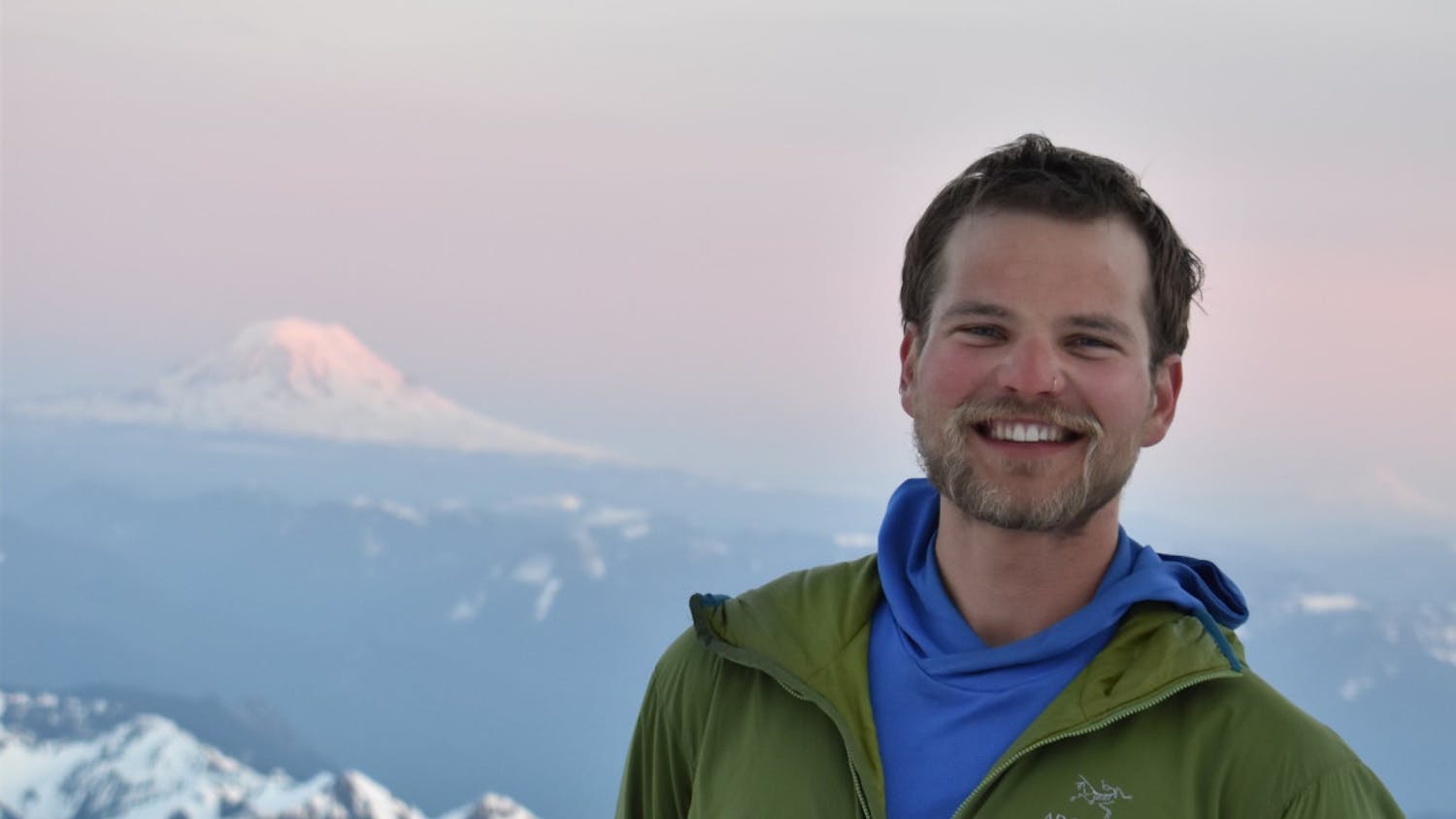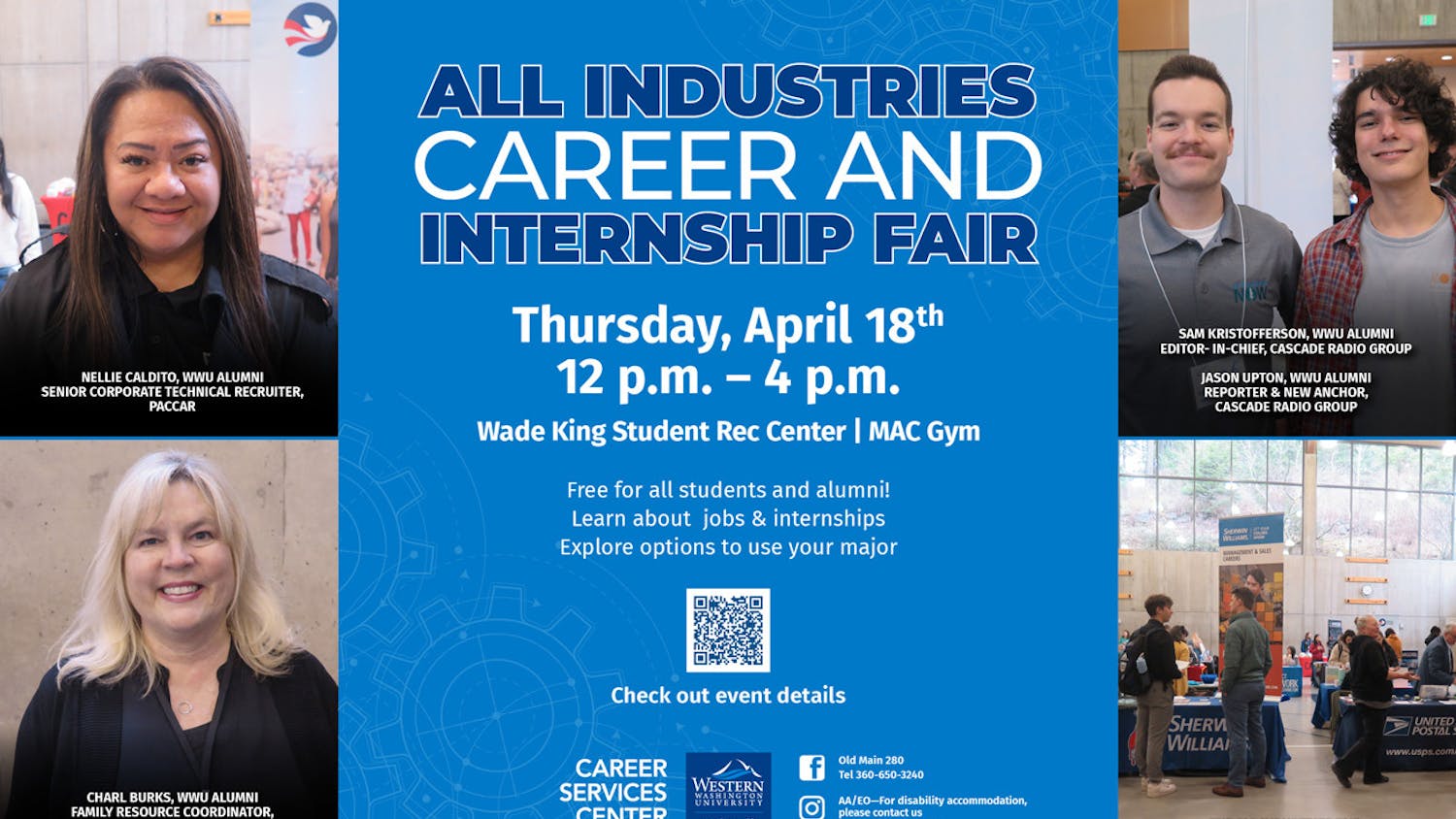Lia Cook receives flowers from friends after giving her TEDxWWUSalon talk about inclusivity in STEM on Friday, April 19. // Photo by Claire Ott
By Claire Ott
Students filled Academic Instructional Center West 204 with excited chatter on Friday, April 19 as they waited for the TEDx talks given by Western students and staff. Justice was the topic of the night, and the two talks touched on the challenges marginalized communities face in the science, technology, engineering and math field plus theand current political climate.
The event was hosted by the Associated Students and TEDxWWU Club. Fourth-year Lia Cook and Victoria Matey, an assistant coordinator of club events within the AS, took the stage for the evening; decorated with black lining and large “TEDxWWUSalon” lettering in the backdrop, the speakers got miked as the room filled with viewers.
TEDxWWU club president Tyler Andrews said that he prefers to hold Salon talks over the traditional style of TEDx because the audience can ask the speakers questions during the Q&A that immediately follows.
“It’s not just somebody with whatever ethos coming on stage and saying their piece sharing it on social media,” Andrews said. “You can actually engage with the community and not just be a passive observer of what's being said, and really be active in that dialogue.”
Matey said publicly speaking on an issue is different than having a one-on-one conversation because there’s no time to dance around the point.
[caption id="attachment_31439" align="alignnone" width="1300"] Victoria Matey, assistant coordinator of club events within the AS, presents her speech on immigration in relation to current events to the attendees of the TEDxWWUSalon event on Friday, April 19. (Photo by Claire Ott)[/caption]
“When I talk in front of a group of people, I don’t sugar coat anything —I’m very to the point because I really need people to get to where I’m at,” Matey said. “I’m not going to get people to think how I’m thinking by just breezing through a conversation to make you feel good about yourself.”
Cook, a community engagement coordinator for the Womxn’s Identity Resource Center, began the evening by defining the term “microaggression,” the use of a comment to express personal bias towards an individual, to the audience. She noted that each and you feel good about yourself.”
Cook, a community engagement coordinator for the Womxn’s Identity Resource Center, began the evening by defining the term “microaggression,” the use of a comment to express personal bias towards an individual, to the audience. She noted that each and every one of us may have habits that perpetuate microaggressions without realizing it. These aggressions begin in our day to day conversations, according to Cook.
Before this event, Cook had previously been told that “playing up the race card” could potentially give her the extra edge over her competitors for positions she would apply to when her grades weren’t high enough.
This is not an act Cook has any interest in participating in. She said that these types of microaggressions can be dehumanizing to the recipient. She said all of us need to practice metacognition, or critically thinking about why we think the things we do.
Cook explained that those in powerful positions must be held accountable for their speech. One way faculty members can improve their practices in this regard would be to reassess the effectiveness of end-of-term evaluations, Cook said. Professors should utilize opportunities to add questions which address the course climate and overall inclusivity of the classroom, she said.
“Instead of continuing to put the labor on marginalized folks, why not focus on inclusivity?” Cook said.
Cook said people who are not a part of marginalized communities need to be mindful of their presence, privilege and the space they occupy.
Matey expanded on the idea of being more mindful. In order to help people of marginalized communities feel safe to speak about their experiences, there needs to be a willingness to listen, she said.
“When you have a conversation, it needs to come from a place of compassion,” Matey said.
Matey detailed the steps she uses to have an impactful dialogue that will promote change. These steps include finding the underlying issue, acknowledging the problem, finding a solution and promoting action.
“It’s not safe for me to be doing this,” Matey said, referring to publicly speaking about her status as an undocumented citizen. “But I know that I have to use my voice for the people who can’t speak up.”
According to Matey, by listening to the narrative of those most affected, we can further prioritize humanity over politics. Matey said it is common practice for politicians to exploit this language for personal gain in the polls.
“There is no border crisis,” Matey said. ‘“The criminalization of a whole community is just the beginning of a humanitarian crisis.”
After the talks came to an end, event attendee, third-year student and candidate for AS President Abdul Malik Ford said he felt assured knowing Western holds events like these.
He said it’s inspiring for him to know that he too could give a TEDx talk someday.
“It’s realistic... I can give a talk, and I’m empowered to do it,” Ford said.
The final TEDxWWUSalon will be held Friday, April 26, and the theme will be Human Health.
Victoria Matey, assistant coordinator of club events within the AS, presents her speech on immigration in relation to current events to the attendees of the TEDxWWUSalon event on Friday, April 19. (Photo by Claire Ott)[/caption]
“When I talk in front of a group of people, I don’t sugar coat anything —I’m very to the point because I really need people to get to where I’m at,” Matey said. “I’m not going to get people to think how I’m thinking by just breezing through a conversation to make you feel good about yourself.”
Cook, a community engagement coordinator for the Womxn’s Identity Resource Center, began the evening by defining the term “microaggression,” the use of a comment to express personal bias towards an individual, to the audience. She noted that each and you feel good about yourself.”
Cook, a community engagement coordinator for the Womxn’s Identity Resource Center, began the evening by defining the term “microaggression,” the use of a comment to express personal bias towards an individual, to the audience. She noted that each and every one of us may have habits that perpetuate microaggressions without realizing it. These aggressions begin in our day to day conversations, according to Cook.
Before this event, Cook had previously been told that “playing up the race card” could potentially give her the extra edge over her competitors for positions she would apply to when her grades weren’t high enough.
This is not an act Cook has any interest in participating in. She said that these types of microaggressions can be dehumanizing to the recipient. She said all of us need to practice metacognition, or critically thinking about why we think the things we do.
Cook explained that those in powerful positions must be held accountable for their speech. One way faculty members can improve their practices in this regard would be to reassess the effectiveness of end-of-term evaluations, Cook said. Professors should utilize opportunities to add questions which address the course climate and overall inclusivity of the classroom, she said.
“Instead of continuing to put the labor on marginalized folks, why not focus on inclusivity?” Cook said.
Cook said people who are not a part of marginalized communities need to be mindful of their presence, privilege and the space they occupy.
Matey expanded on the idea of being more mindful. In order to help people of marginalized communities feel safe to speak about their experiences, there needs to be a willingness to listen, she said.
“When you have a conversation, it needs to come from a place of compassion,” Matey said.
Matey detailed the steps she uses to have an impactful dialogue that will promote change. These steps include finding the underlying issue, acknowledging the problem, finding a solution and promoting action.
“It’s not safe for me to be doing this,” Matey said, referring to publicly speaking about her status as an undocumented citizen. “But I know that I have to use my voice for the people who can’t speak up.”
According to Matey, by listening to the narrative of those most affected, we can further prioritize humanity over politics. Matey said it is common practice for politicians to exploit this language for personal gain in the polls.
“There is no border crisis,” Matey said. ‘“The criminalization of a whole community is just the beginning of a humanitarian crisis.”
After the talks came to an end, event attendee, third-year student and candidate for AS President Abdul Malik Ford said he felt assured knowing Western holds events like these.
He said it’s inspiring for him to know that he too could give a TEDx talk someday.
“It’s realistic... I can give a talk, and I’m empowered to do it,” Ford said.
The final TEDxWWUSalon will be held Friday, April 26, and the theme will be Human Health.





